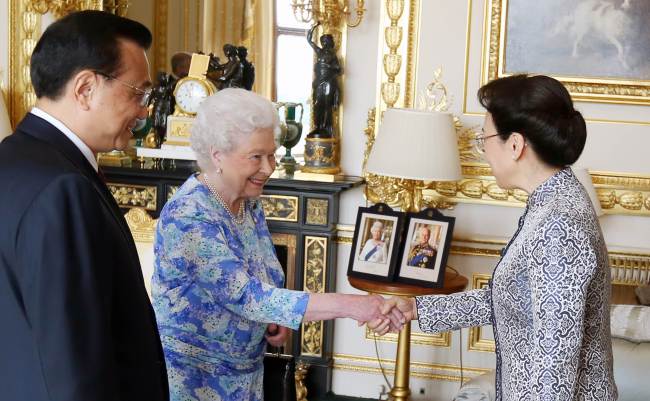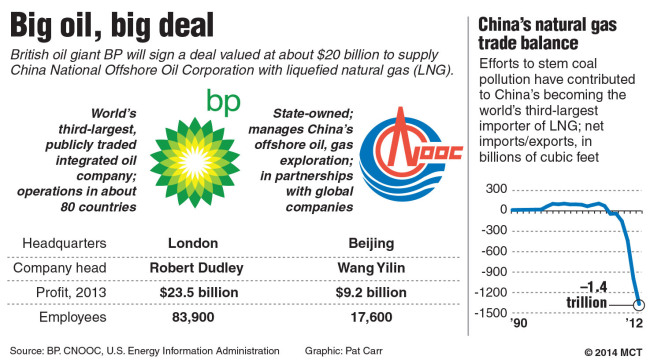China, Britain sign $24b in trade deals
Chinese Premier Li meets Queen Elizabeth II
By Korea HeraldPublished : June 18, 2014 - 21:17
LONDON (AFP) ― Britain and China signed trade deals on Tuesday worth more than 14 billion pounds ($24 billion), during a visit to London by Premier Li Keqiang aimed at resetting economic and diplomatic ties.
Links between Britain and China were strained after British Prime Minister David Cameron met exiled Tibetan spiritual leader, the Dalai Lama, in 2012.
But Li and Cameron said they were now focused on strengthening British and Chinese economic ties after concluding deals and holding talks at Cameron’s Downing Street office.
“Today we have signed deals worth more than 14 billion pounds, securing jobs and long-term economic growth for the British and Chinese people,” Cameron told a joint press conference.
“Ours is truly a partnership for growth, reform and innovation.”
The largest deal was a 12 billion pounds ($20 billion) agreement between British energy giant BP and Chinese state-owned peer CNOOC to supply China with 1.5 million tons of liquefied natural gas per year over 20 years from 2019.
Links between Britain and China were strained after British Prime Minister David Cameron met exiled Tibetan spiritual leader, the Dalai Lama, in 2012.
But Li and Cameron said they were now focused on strengthening British and Chinese economic ties after concluding deals and holding talks at Cameron’s Downing Street office.
“Today we have signed deals worth more than 14 billion pounds, securing jobs and long-term economic growth for the British and Chinese people,” Cameron told a joint press conference.
“Ours is truly a partnership for growth, reform and innovation.”
The largest deal was a 12 billion pounds ($20 billion) agreement between British energy giant BP and Chinese state-owned peer CNOOC to supply China with 1.5 million tons of liquefied natural gas per year over 20 years from 2019.


China Minsheng Investment Corporation, China’s largest private sector investment group, will open its European headquarters in London, with an investment of around 1.5 billion pounds in a range of sectors.
Meanwhile, Royal Dutch Shell, the Anglo-Dutch oil giant, signed a cooperation agreement with CNOOC covering upstream, midstream and downstream activities.
Last year, British exports to China averaged more than 1 billion pounds each month, while more than 8 billion pounds of investment flowed the other way in 2013 to 2014.
Cameron said he would continue to press the European Union to strike a trade deal with China, and for free trade within the Group of 20 and the World Trade Organization members.
The British premier flew to China in December with a delegation of business leaders as part of his drive to bolster growth after the financial crisis by boosting trade with major emerging economies.
Earlier, Li met Queen Elizabeth II at Windsor Castle as part of his three-day visit.
Dozens of Chinese flocked to see him arrive for private talks at the mediaeval castle, west of London.
The Times newspaper reported last week that Beijing made a meeting between Li and the British monarch a precondition for the visit and threatened to call it off if it was not arranged.
The Free Tibet campaign group had written to Queen Elizabeth, urging her not to meet Li.
Pro-Tibet campaigners demonstrated outside Cameron’s 10 Downing Street office, posing in handcuffs and waving placards reading: “Free Tibet before free trade.”
Their chants could be heard as Cameron greeted Li on the steps of No. 10.
Ahead of the visit, Deputy Prime Minister Nick Clegg said the Britain would not shy away from raising China’s “large scale and systematic” human rights abuses.
Asked about Clegg’s comments, Li said: “I don’t really expect there will be uniform opinion about issues in this country.”
Countries at different stages of their development, with different historical and cultural backgrounds, “may see this issue of human rights from different perspectives,” he added.
Asked about the Scottish independence referendum, to be held in September, Li said he wanted to see a “strong, prosperous and united United Kingdom.” but added: “We certainly respect the choice you make.”
The British premier also said he and Li had discussed the deteriorating situation in Iraq and the need for the government in Baghdad to “pursue an inclusive process that can unite the country.”
Meanwhile in a joint statement between Britain and China said they recognized that “the threat of dangerous climate change as one of the greatest global challenges we face.”
They said the evidence of man-made climate change amounted to an “urgent call to action.” and said the 2015 Paris conference will mark a “pivotal moment” in the worldwide effort to respond to the threat.
-
Articles by Korea Herald



![[Herald Interview] 'Amid aging population, Korea to invite more young professionals from overseas'](http://res.heraldm.com/phpwas/restmb_idxmake.php?idx=644&simg=/content/image/2024/04/24/20240424050844_0.jpg&u=20240424200058)















